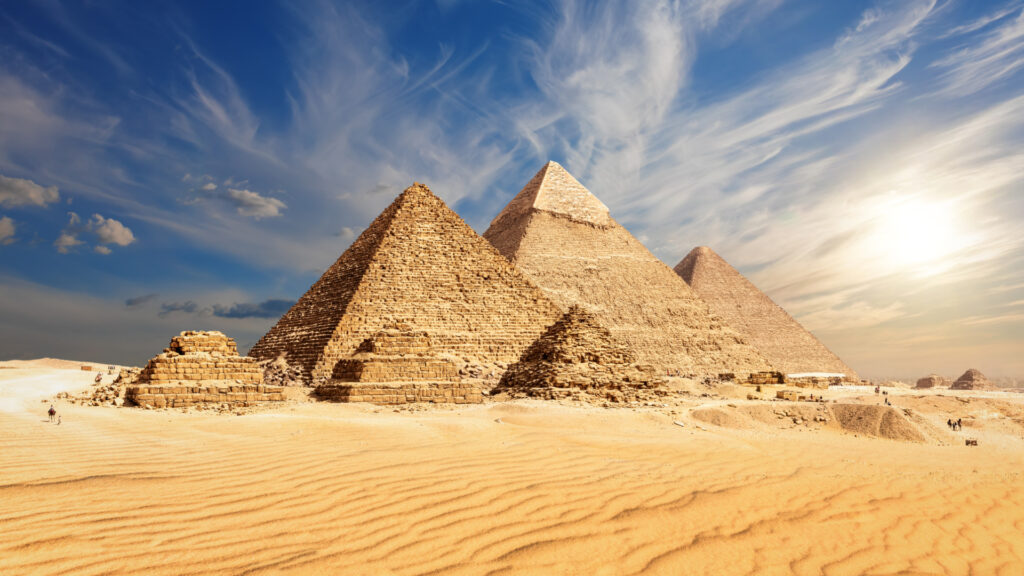Exodus
A Reluctant Leader
Read This Week: Exodus 4
Now the Lord had said to Moses in Midian, “Go back to Egypt, for all those who wanted to kill you are dead.” So Moses took his wife and sons, put them on a donkey and started back to Egypt. And he took the staff of God in his hand. The Lord said to Moses, “When you return to Egypt, see that you perform before Pharaoh all the wonders I have given you the power to do. – Exodus 4:19-21 NIV
Exodus 4 details the application of Moses’ call to lead the Israelites out of Egyptian bondage. It shows Moses’ initial reluctance as a leader but points to God’s provision of miraculous signs to validate his mission. This chapter eventually leads us to the beginning of his flight back to Egypt and the initial stages of the Israelites’ journey to freedom. As we continue to study and read this book, we understand and glean from the Bible’s insights into supernatural faith, obedience to God’s calling, and the power of the Lord’s faithfulness.
Moses, initially hesitant to accept God’s call, questions his own abilities and fears the Israelites’ disbelief. However, God provides Moses with miraculous signs that are validations and powerful demonstrations of His divine power. The first sign, transforming his staff into a serpent and back, is a breathtaking display of God’s might. The second sign, Moses’ hand being made leprous and restored, further proves Yahweh’s power and Moses’ divine commission. The mention of a third sign, turning water from the Nile into blood, is compelling proof of God’s intervention and leaves us in awe of His supremacy.
Despite these supernatural and extraordinary signs, Moses argues that he is not eloquent and slow in speech. He feels inadequate to confront the Pharaoh and lead the Israelites to their destiny. God reassures Moses that He will help him speak and teach him what to say, emphasizing that He equips those He calls. Moses, still hesitant, asks God to send someone else. God becomes angry but provides a solution by appointing Aaron, Moses’ brother, as his spokesperson. Aaron will speak on behalf of Moses, and Moses will perform the signs.
Having received assurance and support from God, Moses began the road back to Egypt. The Lord instructed Moses on what to say to Pharaoh and warned him of the Egyptian leader’s hardened heart. God outlined that the consequences of Pharaoh’s refusal were the death of his firstborn son. Meanwhile, Aaron meets Moses in the wilderness, as instructed by God, and they talk about all the words of the Lord and the signs He commanded. Moses and Aaron gather the elders of Israel, and Aaron speaks while Moses performs the signs. The people believe and worship, recognizing that God has heard their cries and seen their affliction.
Despite Moses’ reluctance and perceived inadequacies, God provides the necessary tools and support. This example encourages us to trust that the Father will equip us for the tasks He calls us to do, no matter our shortcomings. Moses’ journey also demonstrates the importance of stepping out in faith and obeying God’s commands, even when we feel unqualified or afraid. Fear and a feeling of insufficiency can keep us from our mission and from taking hold of the moments and opportunities God desires for us to lay hold of. He responds to us just as He did to Moses. The Lord always expresses patience and provision as He understands our weaknesses and provides what we need to fulfill His purposes. We see this in our daily lives and relationships.
The Scriptures are robust and effective in teaching us about God’s faithfulness, the importance of unwavering obedience, and the assurance that He equips those who are called according to His purpose. Even though, in our human frailty, we can be reluctant leaders, the Holy Spirit equips us specifically for every task and role that Jesus commissioned us for. As we continue to absorb Moses’ life and calling, we are reminded to trust in God’s provision and step out in faith, knowing He will guide and support us in fulfilling His kingdom purposes.
Here I Am
Read This Week: Exodus 3
There the angel of the Lord appeared to him in flames of fire from within a bush. Moses saw that though the bush was on fire it did not burn up. So Moses thought, “I will go over and see this strange sight—why the bush does not burn up.” When the Lord saw that he had gone over to look, God called to him from within the bush, “Moses! Moses!” And Moses said, “Here I am.” – Exodus 3:2-4 NIV
Exodus 3 is one of the most well-known and profound chapters in the Bible. It is one where the ordinary collides with the extraordinary, and a runaway shepherd is transformed into a prophet chosen to deliver God’s people. This section lays the groundwork for the liberation of the Israelites from Egyptian bondage and introduces the depth of Moses’s character and divine mission. Everything from the setting to the peripheral circumstances to the miraculous way God revealed Himself is breathtakingly captivating.
It begins with Moses tending his father-in-law Jethro’s flock. He leads them to the far side of the wilderness, to Horeb, known as the mountain of God. Here, he encounters a burning bush that is not consumed by the flames. This extraordinary sight catches Moses’ attention, and he decides to investigate. As Moses approaches, God calls out from the bush, Moses, Moses! (v.4) Moses responds, Here I am (v.4). God instructs Moses to remove his sandals, for he is standing on holy ground.
God identifies Himself as the God of Abraham, Isaac, and Jacob and acknowledges the suffering of the Israelites in Egypt. He declares His intention to deliver them from bondage and lead them to the promised land. The Lord then commissions Moses to return to Egypt and lead the journey to freedom. Moses expresses doubt and insecurity, questioning his own adequacy for such a monumental task, particularly his speaking abilities. But God reassures him, I will be with you, and appoints Aaron, Moses’ brother, to be his spokesman.
Moses anticipates the Israelites asking for the name of the God who sent him. God responds with, I AM WHO I AM. This profound declaration reveals God’s eternal, self-existent nature. He instructs Moses to tell the Israelites, I AM has sent me to you.
This chapter contains so many life lessons. We are reminded that God often meets us in the mundane moments of life. Moses was simply doing his job when he encountered God. We must be attentive to the ordinary because it may be a gateway to a divine experience with the Lord. His Holy Spirit will help us recognize and respect the sacred moments and spaces in our lives as we approach them with humility and reverence.
We also see that Father God is aware of our struggles and has a plan for our deliverance. We have to trust in His timing and promises when faced with daunting tasks while remembering that it’s not about our capability but God’s presence with us. His assurance is our strength, and understanding His nature as eternal, unchanging, and self-sufficient helps us trust Him more deeply.
Moses’ story makes us keenly aware that God equips those He calls. When He sends us, He provides the necessary tools and signs to fulfill our mission. The Lord understands our weaknesses and provides support. He brings people into our lives to help us accomplish His purposes.
Exodus 3 is a chapter rich with theological insights and practical lessons. It reminds us of God’s holiness, attentiveness to our suffering, and desire to deliver and use us despite our inadequacies. As we reflect on this chapter, let’s be open to encountering God in our everyday lives, trust in His presence, and step out in faith to fulfill the tasks He has set before us. In our own journeys, may we, like Moses, respond to God’s call with a heart ready to say, “Here I am.”
A Basket of Destiny
Read This Week: Exodus 2
Now a man of the tribe of Levi married a Levite woman, and she became pregnant and gave birth to a son. When she saw that he was a fine child, she hid him for three months. But when she could hide him no longer, she got a papyrus basket for him and coated it with tar and pitch. Then she placed the child in it and put it among the reeds along the bank of the Nile. – Exodus 2:1-3 NIV
If the first chapter of Exodus was about growth and change for the children of Israel, then the second chapter is about the pivotal moment where the significant change comes to a breaking point. It marks an important transition in the story of God’s people that will resonate for generations. It covers the early life of Moses, who became one of the most central figures in the Old Testament. It is rich with spiritual symbolism and themes of the Lord’s provision, and it sets the stage for the liberation of the Israelites from Egypt.
In verses 1-10, we see the birth and rescue of Moses. He is born to Amram and Jochebed and is hidden for three months to protect him from Pharaoh’s decree. Then Jochebed places Moses in a basket or small ark made of bulrushes and puts it among the reeds of the Nile River. Pharaoh’s daughter discovers Moses while bathing in the river and decides to adopt him as her own son. Moses’ sister Miriam suggests their mother as a nursemaid for the child, allowing Moses to be raised within his own family and culture.
As if that wasn’t compelling enough, the intrigue surrounding Moses’ story heightens in verses 11-25. Moses, now a grown man, witnesses an Egyptian beating a Hebrew enslaved person. Outraged, he kills the Egyptian and hides his body. Fearing repercussions, Moses flees to Midian, where he helps the daughters of Jethro at a well. Then, some years later, he marries Zipporah, one of Jethro’s daughters, and decides to settle in Midian. Despite Moses’ new life, the Israelites’ cry for deliverance from their slavery reaches God’s ears, setting the stage for future events.
Throughout this chapter, we can’t help but see the Lord’s will evident in Moses’ survival and his positioning within Pharaoh’s household. Just like Jospeh in the latter part of Genesis, God’s plan for Moses is set in motion despite long, insurmountable odds. His identity as a Hebrew raised in the house of Pharaoh becomes central to his role as the deliverer of his people. His upbringing provides him with unique insights and capabilities. Even Moses’ failure and act against the Egyptian and his flight to Midian foreshadow the themes of justice and liberation that will define this book as we continue our study.
Exodus 2 teaches us to trust in God’s promises and provision, even in difficult circumstances. Just as Moses was protected and guided through improbable means and circumstances, we can rely on God’s timing and plan in our own lives. His was a basket of destiny, and so can ours be as the Lord often uses things and people on our path that we do not expect to lead us to the place and purpose He has for us. Though we don’t often see it in unfolding events, Father God’s divine and mighty hand guides us and our steps.
Jochebed’s patience and trust in God while she hid Moses provide a model of faithfulness and obedience for us when we want to run ahead of the Lord’s perfect timing. It reminds us that God can work through our waiting and trust. Moses’ act of defending the Hebrew slave also shows us the importance of standing up against injustice, even at personal cost. It encourages us to be courageous in advocating for others.
Like Moses, understanding our identity and calling plays a crucial role in fulfilling God’s purpose for our lives. God often uses our unique backgrounds and experiences to shape how we serve Him. As we reflect on his early life, may we be inspired to trust in God’s plan, act courageously, and faithfully follow His calling. We never know nor can we predict how He will see fit to use us wherever we go or what our spiritual future will be on this earth. We simply must follow the Holy Spirit’s leading in our own basket of destiny.
Growth and Change
Read This Week: Exodus 1
Now Joseph and all his brothers and all that generation died, but the Israelites were exceedingly fruitful; they multiplied greatly, increased in numbers and became so numerous that the land was filled with them. Then a new king, to whom Joseph meant nothing, came to power in Egypt. “Look,” he said to his people, “the Israelites have become far too numerous for us. – Exodus 1:6-9 NIV
The Book of Exodus, the second book of the Pentateuch, is traditionally attributed to Moses and is a continuation of the Genesis narrative. As Genesis ends, Joseph has risen to power in Egypt, and his family has settled there. Exodus 1 begins several generations later, long after Joseph’s death. The Israelites have become numerous and prosperous (v.7), which leads to their enslavement and harsh treatment by a new Pharaoh who does not remember Joseph (v. 9-10).
The first chapter sets the stage for one of the most compelling narratives in the Bible: the story of Moses and the Israelites’ journey to freedom from Egypt. It discusses growth and change while laying the groundwork for understanding the circumstances that led to their oppression and the subsequent rise of Moses as their leader.
Despite the Egyptians’ efforts to subdue them, the Israelites continue to thrive. Verse 12 says that the more they were oppressed, the more they multiplied and spread, so the Egyptians came to dread the Israelites. This growth foreshadows a future theme in the Bible: that God’s people often grow and strengthen under adversity. This same resilience and perseverance can be seen in the Hebrew midwives, Shiphrah and Puah, in verse 17, who defy Pharaoh’s orders to kill all newborn Hebrew boys. It says they feared God and did not do what the king of Egypt had told them to do; they let the boys live. Their courage and faith are rewarded by God, who grants them families of their own.
The actions of the Hebrew midwives demonstrate the power of obedience to God, moral courage, and the willingness to please the Lord more than man. They chose to obey God rather than succumb to the unjust commands of a powerful ruler. These circumstances can also be true in our lives; we often face pressures to conform to societal norms that may conflict with our values and the word of God. The example of Shiphrah and Puah encourages us to stand firm in our convictions and trust in Father God’s provision.
The Israelites’ experience in Egypt also reminds us that growth often comes through hardship. Personal and collective challenges can strengthen our character and community. When faced with difficulties, rather than despair or give in to hopelessness, we can view these moments as opportunities for growth, Spirit-led change, and reliance on our faith to sustain us. We shouldn’t act as Pharaoh did and let fear and insecurity drive our actions, particularly towards others. It should cause us to look inward, pray, and ask Jesus to show us how to treat those perceived as threats and seek more just and compassionate responses. A Christ-centered approach versus what the world suggests can positively impact wherever we find ourselves.
The growth of the Israelites and the change coming to their nation in Exodus 1 sets the stage for the dramatic events that follow in the story. As the whole of this book will, it highlights themes of oppression, resilience, and faith, offering profound lessons applicable to our modern lives. By studying Exodus, we will gain insights into the dynamics of power and fear, freedom, the importance of standing firm in our beliefs, and the strength that can arise from enduring hardships. As we read and study, may we be led by the Holy Spirit and guided to navigate our challenges with faith, courage, and compassion.



